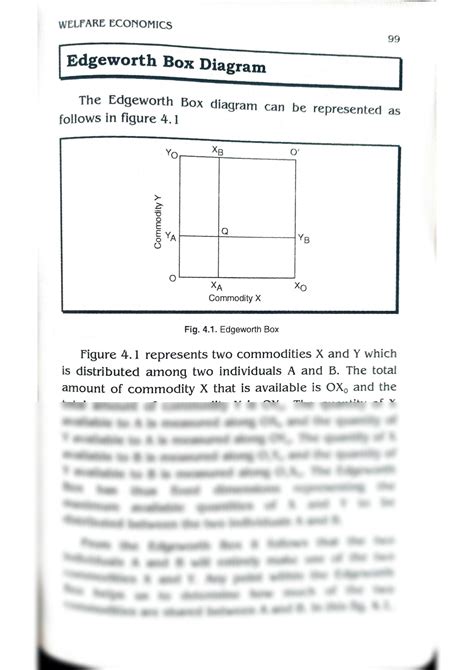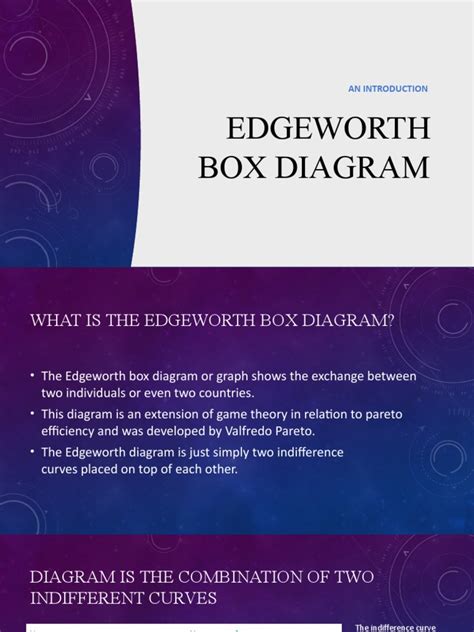distribution possibilities box econ Distribution Possibilities Box (DPB) A representation of how goods are distributed to individuals within a PPF. A point represents how much of each good will be given to each household. Steel Tool Boxes: A great choice for professional use, the heavy-duty material ensures strength and durability for an option that’ll stand up to tough jobsite conditions and keep your tools safe for years to come. Plastic Tool Boxes: These are an inexpensive choice for keeping core tools organized and easily accessible.
0 · Welfare economics I: Edgeworth box
1 · Understanding the Edgeworth Box: A Tool for
2 · The Edgeworth Box Diagram Explained
3 · Social Preferences and Equity
4 · Edgeworth box
5 · Edgeworth Box Diagram
6 · Edgeworth Box Definition & Examples
7 · Edgeworth Box
8 · Econ 101
9 · Competitive Equilibrium
You can use a DIN rail assembly in applications where you need to house a power supply, DC/DC converter, timer, surge suppression device, Ethernet interface, programmable .

The Edgeworth Box Diagram, also known as the Edgeworth-Bowley Box, is a graphical representation used in economics to analyze the exchange of goods between two individuals, typically in the context of microeconomics and .Distribution Possibilities Box (DPB) A representation of how goods are distributed to individuals within a PPF. A point represents how much of each good will be given to each household. The Edgeworth box is a graphical tool used in microeconomics to analyze the distribution of goods or resources between two agents in an economy. It helps in .
The first example is mainly used for welfare economics and distribution matters. As we see, this “box” is formed using two sets of typical indifference maps , which in this case represent the .In economics, an Edgeworth box, sometimes referred to as an Edgeworth-Bowley box, is a graphical representation of a market with just two commodities, X and Y, and two consumers. The dimensions of the box are the total quantities Ωx and Ωy of the two goods. Let the consumers be Octavio and Abby. The top right-hand corner of the box . The Edgeworth Box, developed by Francis Ysidro Edgeworth, is a tool used in microeconomic theory to illustrate the potential outcomes of trade between two individuals or .
In the Edgeworth box diagram, a single point is defined as the consumption bundle of both individuals. The allocation A 0 has individual 1’s allocation and he is getting the consumption bundle (x 011, x 012). The individual 2 is getting (x .In this section we’ll think about different ways of evaluating allocations beyond just whether they are efficient or not. Just as we analyzed the “feasible set” for Chuck on a desert island in Part .
The Edgeworth Box is a graphical representation that allows us to visualize the potential outcomes of exchange between two individuals or countries. By understanding the Edgeworth Box, students can gain insights .In the model of competitive equilibrium in the Edgeworth box, we’ll start from an assumption that both agents are price takers: that is, they believe that they can buy and sell goods from their .The Edgeworth Box Diagram, also known as the Edgeworth-Bowley Box, is a graphical representation used in economics to analyze the exchange of goods between two individuals, typically in the context of microeconomics and welfare economics.
Welfare economics I: Edgeworth box
Distribution Possibilities Box (DPB) A representation of how goods are distributed to individuals within a PPF. A point represents how much of each good will be given to each household. The Edgeworth box is a graphical tool used in microeconomics to analyze the distribution of goods or resources between two agents in an economy. It helps in understanding how these agents can exchange goods or resources with each other to reach a more efficient allocation, given their preferences and initial endowments.The first example is mainly used for welfare economics and distribution matters. As we see, this “box” is formed using two sets of typical indifference maps , which in this case represent the indifference curves of agents A (green) and B (red), who must choose quantities of goods x and y.In economics, an Edgeworth box, sometimes referred to as an Edgeworth-Bowley box, is a graphical representation of a market with just two commodities, X and Y, and two consumers. The dimensions of the box are the total quantities Ω x and Ω y of the two goods.
The Edgeworth Box, developed by Francis Ysidro Edgeworth, is a tool used in microeconomic theory to illustrate the potential outcomes of trade between two individuals or parties, given their preferences, endowments, and consumption of two goods.In the Edgeworth box diagram, a single point is defined as the consumption bundle of both individuals. The allocation A 0 has individual 1’s allocation and he is getting the consumption bundle (x 011, x 012). The individual 2 is getting (x 021, x 022) the consumption bundle.
In this section we’ll think about different ways of evaluating allocations beyond just whether they are efficient or not. Just as we analyzed the “feasible set” for Chuck on a desert island in Part I, we’ll analyze the set of possible combinations of utility available within the Edgeworth Box.
The Edgeworth Box is a graphical representation that allows us to visualize the potential outcomes of exchange between two individuals or countries. By understanding the Edgeworth Box, students can gain insights into the concepts of efficiency, Pareto optimality, and the potential gains from trade. The Basics of the Edgeworth BoxIn the model of competitive equilibrium in the Edgeworth box, we’ll start from an assumption that both agents are price takers: that is, they believe that they can buy and sell goods from their endowment at given, market prices.The Edgeworth Box Diagram, also known as the Edgeworth-Bowley Box, is a graphical representation used in economics to analyze the exchange of goods between two individuals, typically in the context of microeconomics and welfare economics.
Distribution Possibilities Box (DPB) A representation of how goods are distributed to individuals within a PPF. A point represents how much of each good will be given to each household. The Edgeworth box is a graphical tool used in microeconomics to analyze the distribution of goods or resources between two agents in an economy. It helps in understanding how these agents can exchange goods or resources with each other to reach a more efficient allocation, given their preferences and initial endowments.
The first example is mainly used for welfare economics and distribution matters. As we see, this “box” is formed using two sets of typical indifference maps , which in this case represent the indifference curves of agents A (green) and B (red), who must choose quantities of goods x and y.In economics, an Edgeworth box, sometimes referred to as an Edgeworth-Bowley box, is a graphical representation of a market with just two commodities, X and Y, and two consumers. The dimensions of the box are the total quantities Ω x and Ω y of the two goods.
Understanding the Edgeworth Box: A Tool for
The Edgeworth Box, developed by Francis Ysidro Edgeworth, is a tool used in microeconomic theory to illustrate the potential outcomes of trade between two individuals or parties, given their preferences, endowments, and consumption of two goods.In the Edgeworth box diagram, a single point is defined as the consumption bundle of both individuals. The allocation A 0 has individual 1’s allocation and he is getting the consumption bundle (x 011, x 012). The individual 2 is getting (x 021, x 022) the consumption bundle.In this section we’ll think about different ways of evaluating allocations beyond just whether they are efficient or not. Just as we analyzed the “feasible set” for Chuck on a desert island in Part I, we’ll analyze the set of possible combinations of utility available within the Edgeworth Box. The Edgeworth Box is a graphical representation that allows us to visualize the potential outcomes of exchange between two individuals or countries. By understanding the Edgeworth Box, students can gain insights into the concepts of efficiency, Pareto optimality, and the potential gains from trade. The Basics of the Edgeworth Box

tube steel box leg
tudor house with metal roof
Store your tools with our selection of tool chests, cases, belts, bags & truck and job boxes. Find top-quality tool storage options to organize & secure your tools.
distribution possibilities box econ|Welfare economics I: Edgeworth box